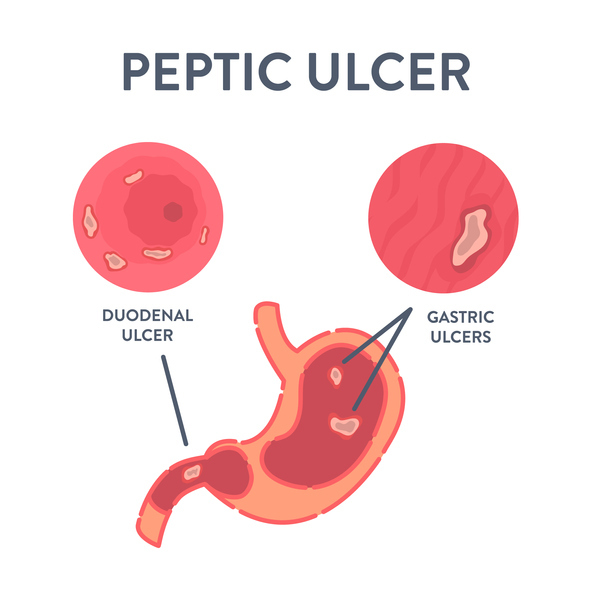
What You Need to Know About Ulcers
Everyone gets a bout of heartburn from time to time. Maybe that combo of beer and pizza didn’t sit just right, or you shouldn’t have opted for the spiciest of Thai curry. However, some patients feel heartburn—and other distressing GI symptoms—on a much larger scale when they have a condition known as a stomach ulcer. Also referred to as a peptic ulcer, this condition is not always serious but can impact a person’s quality of life. Read on to learn more about ulcers, ulcer symptoms, ulcer treatment, and when to see your healthcare provider if you suspect you have an ulcer.
What Are Ulcers?
There are mucous membranes that line the stomach, and sometimes they break down. Because of the strong acid levels in the stomach, the mucus that protects the lining begins to weaken, and sometimes sores form. These sores are called peptic ulcers (or stomach ulcers). It’s estimated that 1 in every 10 people in the Western world will have an ulcer at some point in their lives. You may have seen movies or television shows where it insinuates that stress causes or exacerbates ulcers, when in fact, stress is not the cause of ulcers. In reality, the most common cause of stomach ulcers is a Helicobacter pylori (H. pylori) infection. The second leading cause of ulcers is the overuse of nonsteroidal anti-inflammatory drugs, such as ibuprofen, aspirin, and naproxen. Using these drugs too often can break down the lining of the stomach. A third, less common cause is a disease known as Zollinger-Ellison syndrome.

What Are the Symptoms of Ulcers and How Are Ulcers Diagnosed?
Patients may wonder what the differences are between “regular” heartburn and digestion and something slightly more serious, such as acid reflux or an ulcer. The most common complaint that patients present with when they have an ulcer is a feeling of burning in the stomach, particularly when the stomach is empty. As opposed to heartburn, this burning is located more in the mid-abdomen between the navel and chest. The pain could last for a few minutes to several hours. There may be other symptoms associated with one, such as:
- Heartburn
- Stomach pain that improves with regular antacid use or with eating and drinking
- Tarry stools
- Vomit that looks like coffee grounds
- Sudden, unexplained weight loss
- Nausea and vomiting
- Dull pain in the stomach
- Excessive burping
- Loss of appetite due to pain
Patients often also ask, do ulcers cause bad breath? Sometimes. The ulcer itself may not cause bad breath, but if you do indeed have an H. pylori infection, that bacteria is known for causing a somewhat sweet but unpleasant odor that can be described as similar to ammonia or urine. So, if a close friend or loved one has mentioned that you suddenly have bad breath, this could be another possible symptom to mention to your healthcare provider.
If you have a combination of these symptoms, it may be an excellent time to speak with your healthcare provider or a gastroenterologist specializing in GI disorders.
To diagnose an ulcer in the stomach, a doctor will have to perform several tests. One of the most common and least invasive testing procedures includes a barium swallow, which means you drink a small amount of barium and wait. Your physician is then able to view your stomach and small intestine on an X-ray machine.
Another option is an EGD or an upper endoscopy. During this procedure, a small tube is inserted into the patient’s mouth with a camera on one end to a look at the small intestine. The test can go even further, and an endoscopic biopsy can be performed, where a small piece of tissue is taken from the small intestine to be examined. Once the results come back from your testing, if it is determined that you have an ulcer, your treatment plan will depend on the cause of the ulcer itself.
How Are Ulcers Treated?
Many patients ask the question, “are ulcers curable?” The answer to this is yes. Some ulcers do go away on their own with diet and lifestyle changes, depending upon the severity of the ulcer. However, it does matter what the cause of the ulcer is because if H. pylori caused it, you would need medication in order to arrest the ulcer. Your doctor may suggest:
- Proton pump inhibitors (PPIs). These block stomach cells that produce acid.
- H2 receptor blockers. These have a different mechanism of action than PPIs but ultimately do the same thing—block the stomach cells that produce acid.
- Cessation of all NSAID use. Most physicians will suggest acetaminophen, which is an analgesic)
- Probiotics. This helps kills off H. pylori in the body.
- Bismuth supplements.
If the ulcer is caused by NSAID usage, then the first-line course of action is to stop NSAID usage immediately.
Sometimes an ulcer will require surgery, although it is rare. It usually happens in cases where there are recurrent ulcers, where there is bleeding, where there is a tear in the stomach, or if it does not heal. A surgical procedure may:
- Remove the entire ulcer
- Tie off a bleeding artery
- Reduce the production of stomach acid by cutting off the nerve supply to the stomach
- Taking healthy intestinal tissue and patching it over the ulcer
Your doctor may also suggest that you change your diet in order to prevent ulcers from returning. Poor diet and other unhealthy habits (such as heavy drinking and cigarette smoking) certainly contribute to acid reflux and may play a role in ulcers, so it’s best to quit smoking, drink moderately, and follow a healthy diet. Some foods you can add to your diet to create healthy bacteria to naturally fight H. pylori include:
- Olive oil
- Berries (blueberries, raspberries, strawberries, blackberries)
- Fermented foods (sauerkraut, kombucha, yogurt, kimchi, miso)
- Broccoli, cauliflower, cabbage, and radishes
- Leafy greens, such as kale and spinach
- Apples
If you have had an ulcer or have had one in the past, you may want to steer clear of spicy foods or carbonated beverages, as they can aggravate acid reflux and trigger heartburn.
If you have had ulcers or believe you have a predisposition to them, the best thing to do is avoid NSAID usage, avoid smoking, drink in moderation, and follow a healthy diet. If you find you have ulcer symptoms, it’s best to contact your healthcare provider. If you need more information on ulcers or would like to be seen by a physician, please contact us at www.needhamgastro.com today. Our healthcare time provides the best care for all of your gastrointestinal concerns.